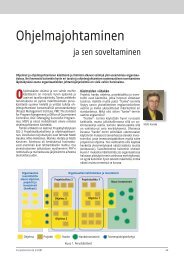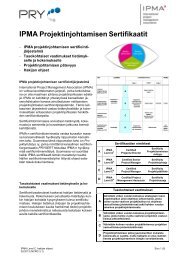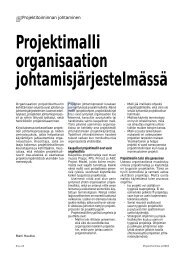Boundary activities and readiness for ... - Projekti-Instituutti
Boundary activities and readiness for ... - Projekti-Instituutti
Boundary activities and readiness for ... - Projekti-Instituutti
Create successful ePaper yourself
Turn your PDF publications into a flip-book with our unique Google optimized e-Paper software.
Theoretical background<br />
between temporary projects <strong>and</strong> permanent organizations. The concept of<br />
time is also relevant to the current study due to the focus on the program<br />
emergence <strong>and</strong> the early program <strong>activities</strong>. The task dimension refers to<br />
the goal of the program, the desired change in the parent organization. The<br />
task of a change program is truly unique <strong>and</strong> especially during the early<br />
program stages involves considerable uncertainty <strong>and</strong> ambiguity (Thiry,<br />
2002). Thus, although an initial assignment may be provided by the parent<br />
organization, the task typically requires significant elaboration. The team<br />
refers to the program organization. The core program team that includes<br />
the main program management roles may be supported by a larger group of<br />
peripheral participants <strong>and</strong> consultants. In the context of change programs,<br />
the team dimension is especially interesting, as the program personnel<br />
often simultaneously are members of the parent organization, working<br />
part-time in the program (Eskerod & Jepsen, 2005). Finally, the transition<br />
is associated with the program <strong>activities</strong> that make change happen. The<br />
current study focuses especially on the early <strong>activities</strong> of the program core<br />
team members <strong>and</strong> examines their role in promoting change.<br />
2.1.3 Program initiation<br />
The present study is focused on the early program stage which is critical <strong>for</strong><br />
the success of the entire program. Both programs <strong>and</strong> projects are often<br />
described through process or stage models, depicting different phases in<br />
their lifecycle. The most basic division is made between planning <strong>and</strong><br />
execution. For example, Dobson (2001) divides a change program into<br />
development <strong>and</strong> implementation, whereas Pinto <strong>and</strong> Mantel (1990) make<br />
a similar division but label the stages as the strategic stage <strong>and</strong> the tactical<br />
stage. There is a general agreement that the early stage, during which the<br />
project or a program is being established <strong>and</strong> planned, is different in nature<br />
<strong>and</strong> requires different kinds of management actions than the later stages<br />
which are about executing the plans <strong>and</strong> delivering the results.<br />
The early stage of a project or a program has repeatedly been promoted as<br />
the most important stage in its lifecycle (Abdul-Kadir & Price, 1995; Dvir et<br />
al., 2003; Gareis, 2000; Uher & Toakley, 1999). At the early stage the goals<br />
are defined <strong>and</strong> a plan is made of how they will be achieved. The early stage<br />
has a significant impact on the <strong>for</strong>thcoming stages (Abdul-Kadir & Price,<br />
1995; Anell, 1998), <strong>and</strong> failure to carry out the early <strong>activities</strong> thoroughly<br />
enough may lead to significant difficulties during execution (Atkinson et al.,<br />
2006; Gareis, 2000; Woodward, 1982). Although the importance of the<br />
early project or program stage has been widely recognized, is has not<br />
received sufficient attention in project management research (Kolltveit &<br />
Grønhaug, 2004; Morris, 1989, 1994). The guidelines offered by the project<br />
management st<strong>and</strong>ards also tend to focus on the management of the<br />
23









